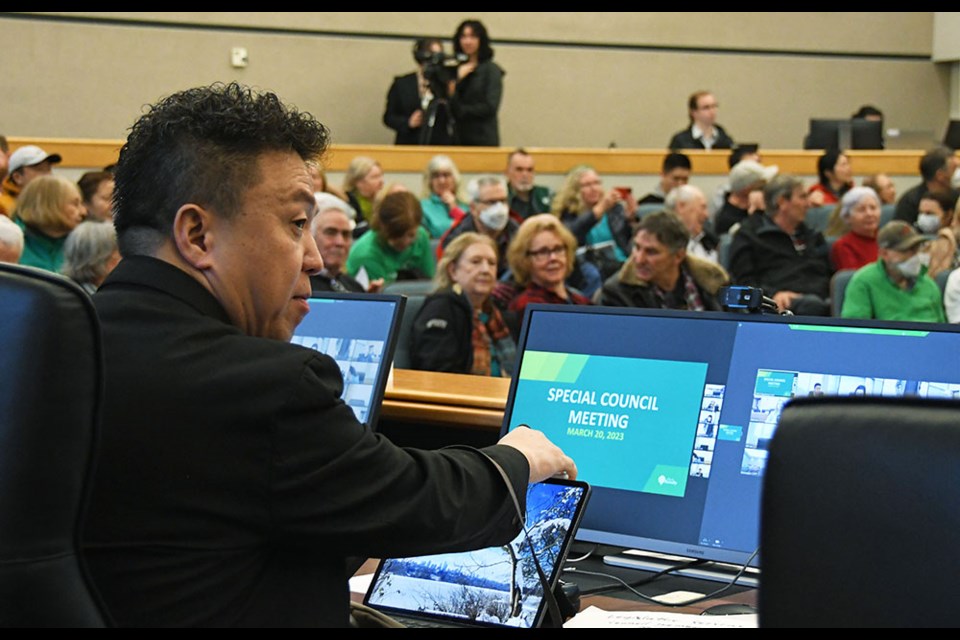Burnaby city council has cancelled a voting process that was required to remove 21 acres of parkland at Fraser Foreshore Park to make way for a green recycling and organic waste facility (GRO).
Mayor Mike Hurley said the decision to put the park removal to an “alternative approval process” (AAP), which required 16,250 Burnaby voters to vote in opposition, was a “misjudgment.”
In a special council meeting earlier today, council voted to cancel the AAP that was underway.
“While the project still remains a good project, and one we will clearly continue to look at other sites for, the public spoke clearly that they did not want it in that location,” he said to media after the vote.
“We just collectively made a mistake on this,” Green Party Coun. Joe Keithley said in the council meeting.
Burnaby residents expressed significant objections to both removing the parkland, which includes sensitive wetland habitat, and the voting process (the AAP) chosen to un-dedicate the parkland. The AAP requires 16,250 Burnaby voters opposed to the parkland removal to submit a ballot by mail or in person.
“The people of Burnaby have spoken strongly and loudly in opposition to this project, with good reason,” Keithley said. “While the GRO project definitely has potential to have net benefits in Burnaby's quest to become carbon neutral, it's become very clear, very, very clear, that this is not the right location. ... The other lesson we learned from this (is) that the projects that we bring forward to the public, we want more engagement,” Keithley said.
“You woke up council to see the light on this,” Keithley said to the residents who protested the project.
Burnaby Citizens Association (BCA) Coun. Alison Gu also thanked residents for their input and noted the climate crisis will require the city to deal with its organics in-region.
“But it does not require us to do so while paving over tidal wetlands and tidal forest and harming ecosystems in the process,” Gu said.
She said city councillors are often told what they can't do.
“Everything I had been told was that it had to be here, or it wouldn’t get built. ... We cannot allow this false choice to exist,” she said.
“Let's work with partners to overcome human-made limitations and get this facility built somewhere else. It will be difficult, but not doing everything in our power and beyond is non-negotiable. My generation is counting on us,” Gu added.
BCA Coun. Sav Dhaliwal said he didn't do enough research on the AAP.
“That was a judgment call: how we take land out ... what we put in,” Dhaliwal said. “I misjudged how well that would not be supported. ... Had I foreseen how this was going to ... divide the community, how this was going to put our staff at risk — a lot of people were upset. A lot of people didn't see us doing (a) good enough job. They thought we were going to just sneak in the middle of the night and just do it. That was never the intent.”
Dhaliwal suggested council commits to never doing an AAP for removing parkland again: “We chose to use AAP; all of us did. We didn't do our homework. None of us did.”
He stressed Burnaby still needs to build the organics processing facility.
“We know that the facility needs to be built. It's our waste — we should be handling it. We should not be just saying it should be trucked somewhere else away from Burnaby.”
GRO protester Parvin Chami, president of the Friends of Discovery Park neighbourhood group, said the decision to not remove the parkland was a “huge victory” for residents.
“This is what we wanted, and we spoke out loud, and council heard us and protected our parkland,” Chami said.
“This victory is going to be history that from now on council will know that they should listen to the public and do the consultation,” she added.
What’s the deal with GRO? Here’s what we’ve written:
- Feb. 6: 20 acres of Burnaby park could be converted from wetlands to waste facility
- Feb. 8 Massive green waste facility planned for Burnaby park heads to public consultation
- Feb. 10: Did Burnaby have to choose park for green waste facility? Yes, it says. Here’s why
- Feb. 25: Mayor Q&A: Burnaby plan to build waste facility on wetlands a 'tough decision' — but necessary
- Feb. 27: Burnaby asks voters to decide on removing 21 acres of parkland
- March 6: Burnaby resident dismayed by ‘archaic’ voting process to remove wetlands
- March 14: Dinosaur, protesters storm Burnaby City Hall to oppose compost plant on wetlands
- March 16: After public outcry, Burnaby mayor wants to nix the proposed compost facility at Fraser Foreshore Park
- March 19: Burnaby residents rally to oppose removing parkland at Fraser Foreshore




